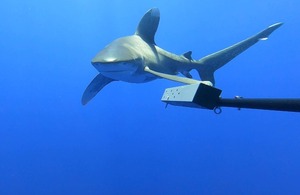How the public can help conserve rare marine species using phones
Government partners with conservation charity ZSL to launch app update allowing tracking and logging of creatures in waters around British Overseas Territories.

Oceanic whitetip shark from underwater cameras that will now be used by Instant Wild.
- UK government partners with conservation charity ZSL to launch app update allowing wildlife enthusiasts to track and log creatures in waters around British Overseas Territories
- minister announces initiative at symposium of flagship Blue Belt ocean protection programme
- additional measures confirmed for South Georgia and South Sandwich Islands, significantly extending protected waters
An app feature that allows the public to identify turtles, sharks and whales using their mobile phones was launched at an event celebrating the UK’s flagship ocean conservation programme.
The collaboration with ZSL’s Instant Wild platform invites people to pull back the blue curtain in the UK Overseas Territories (OTs) by extending its worldwide underwater footage to the abundant marine life swimming in their waters.
It was launched at the Blue Belt Symposium in London, where representatives from the OTs, experts and environmental groups will gather over the next 3 days to discuss the successes and future ambitions of the programme.
Established by the UK government in 2016, the Blue Belt Programme protects more than 4 million square kilometres of ocean across 10 biologically diverse Territories. It is the largest marine protection network anywhere in the world – across the Atlantic, Pacific, Indian and Southern Ocean.
Footage collected by Blue Belt will be now accessible in the OTs via the Instant Wild camera monitoring platform to support conservation efforts in some of the most biodiverse places on the planet.
Despite an estimated population of just 270,000, the OTs are home to 93% of biodiversity found in British territory and combined with the UK, make up the world’s fifth largest marine estate.
As well as allowing amateur enthusiasts to spot species found nowhere else in the world, the data they tag on their personal devices will help OTs governments to understand more about these vital ecosystems.
Minister of State at the Foreign, Commonwealth and Development Office, Lord Benyon, said:
I’m excited to launch our collaboration with ZSL today, which is the latest example of British science stepping up to protect the world’s oceans.
What better way to inspire the next generation of ocean champions than to immerse ourselves into the incredible underwater world of the UK’s Overseas Territories.
Our Blue Belt Programme has led the world in ocean protection and this symposium is a landmark moment to build on its successes. We continue to urge world leaders to sign up to protecting at least 30% of the planet’s ocean by 2030.
ZSL’s Instant Wild project manager Kate Moses said:
Through Instant Wild we aim to democratise access to nature, connecting people to wildlife and providing an insight into what they get up to when we’re not around. So, we’re delighted to put these bright blue waters at people’s fingertips, allowing them to come face-to-face with all the fish, sharks and turtles that swim within them.
No matter where people live – whether they’re on islands, nearby or on the other side of the world – we’re working to ensure that everyone can explore this fascinating hidden world.
Further conservation efforts were announced at the symposium, with South Georgia and the South Sandwich Islands increasing their waters closed to all fishing by almost 200,000 km2 to 449,000km2 – or 36% of the marine protected area.
This, together with existing measures, makes the islands one of the largest and most protected areas of ocean in the world.
Background
- ZSL’s Instant Wild app works by allowing users to watch species being monitored by cameras and then ID-tagging them. Find out more information on the Global Ocean Wildlife Analysis Network (GOWAN): Cayman Islands Projects from ZSL Instant Wild
- the findings on the app will be used by the Global Ocean Wildlife Analysis Network (GOWAN), a sub-programme of Blue Belt. This global biodiversity and habitat monitoring network – the largest of its kind – uses underwater cameras known as Baited Remote Underwater Video Systems (BRUVS) to improve understanding of marine ecosystems and inform management and protection measures
- find out more information on amendments to the South Georgia and the South Sandwich Islands MPA
- the Blue Belt Programme’s vision is for the UK Overseas Territories to protect and enhance ocean health, halt biodiversity loss, enable sustainable growth, build climate change resilience, and to connect people with the natural environment. The Programme underpins some of the UK’s commitments in the 25 Year Environment Plan, the UN Sustainable Development Goals, as well as the commitment to ensure 30% of the world’s ocean are protected by 2030
- the Blue Belt Symposium is taking place between 26 to 28 February, bringing together representatives from all participating UK Overseas Territories. Keynote speeches will be provided by Peter Thomson, United Nations special envoy for the Ocean, Professor Jessica Meeuwig, University of Western Australia and Kate Brown, Global Island Partnerships
Media enquiries
Email [email protected]
Telephone 020 7008 3100
Contact the FCDO Communication Team via email (monitored 24 hours a day) in the first instance, and we will respond as soon as possible.